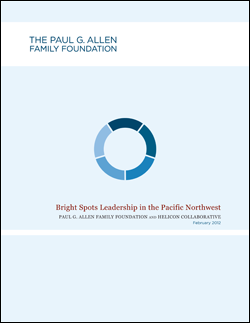Bright Spots Leadership in the Pacific Northwest
February 2012, 31 pages. The Paul G. Allen Family Foundation, 505 5th Avenue South, Suite 900, Seattle, WA 98104, www.pgafoundations.com.
Download:
![]() Bright Spots Leadership in the Pacific Northwest (4.4Mb)
Bright Spots Leadership in the Pacific Northwest (4.4Mb)
Based on a six-month exploration by Helicon Collaborative, this report describes the five characteristics, Bright Spot Principles, shared by cultural organizations that are successfully adapting to changing conditions. The report builds on Dynamic Adaptability, a series of conversations among arts leaders held in Seattle over the last two years.
The operating environment for nonprofit cultural organizations today is daunting. Demographic shifts, changing participation patterns, evolving technology, increased competition for consumer attention, rising costs of doing business, shifts in the philanthropic sector and public funding, and the lingering recession form a stew of change and uncertainty. Every cultural organization is experiencing a combination of these shifts, each in its own way. Yet, while some organizations are struggling in this changing context, others are managing to stay healthy and dynamic while operating under the same conditions as their peers. These groups are observable exceptions, recognized by their peers as achieving success outside the norm in their artistic program, their engagement of community, and/or their financial stability. These are the “bright spots” of the cultural sector.
Who are they?
What are they doing differently?
What can we learn by studying their behavior?
To explore these questions, the Paul G. Allen Family Foundation asked Helicon Collaborative to conduct a study of cultural groups in the Pacific Northwest. The project had two goals:
- to identify “bright spots,” defined as cultural organizations that are successfully adapting to their changing circumstances without exceptional resources,
- to see if these organizations share characteristics or strategies that can be replicated by others.
Helicon interviewed 43 cultural leaders in the Northwest region between August and October 2011. Starting with a handful of people, suggested by the Allen Foundation, they expanded the list based on recommendations from people interviewed and also reviewed the results of more than 60 interviews from a related study that we conducted in 2010 for the Doris Duke Charitable Foundation. Helicon then surveyed a variety of resources on leadership and managing change and vetted the preliminary findings with a cross-section of cultural leaders and funders in the Northwest through three focus groups and a web conference.
This document is a summary of Helicon’s findings. It offers insights about the essential elements common to nonprofit cultural organizations that are adapting and evolving successfully, despite challenging external conditions. The stories profiled here represent a few of the exemplary organizations discovered during this study. They are meant to be illustrative, not definitive.

